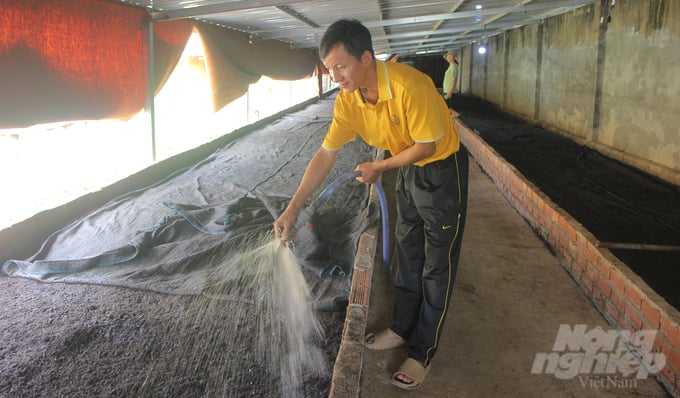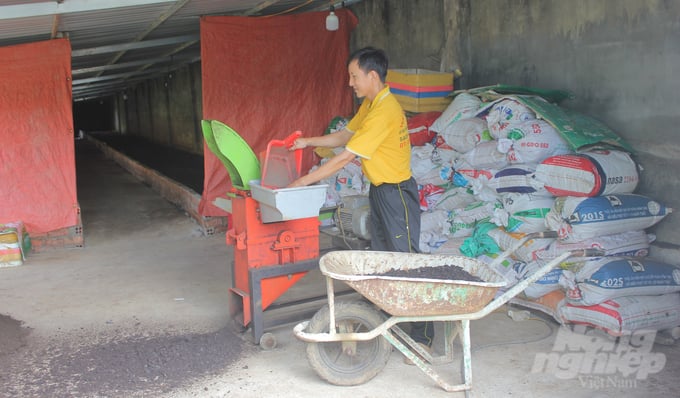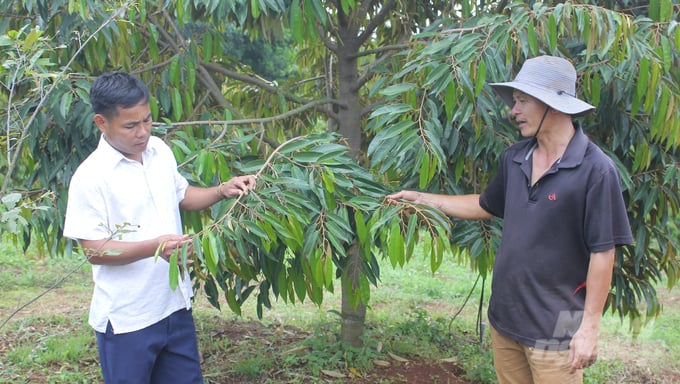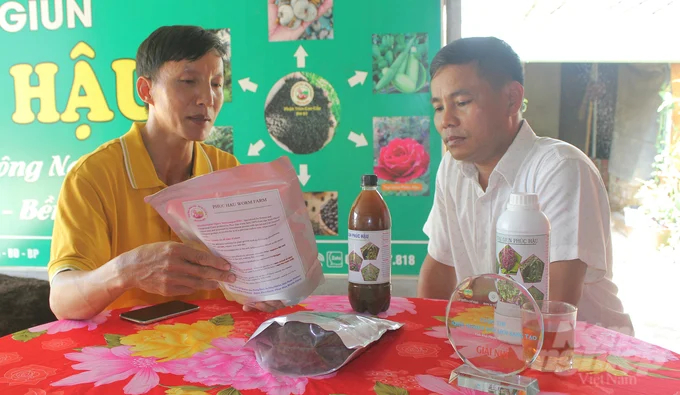June 14, 2025 | 06:00 GMT +7
June 14, 2025 | 06:00 GMT +7
Hotline: 0913.378.918
June 14, 2025 | 06:00 GMT +7
Hotline: 0913.378.918
Bu Dang is considered the cashew capital and has the largest cattle herd in Binh Phuoc province. Although everyone knows cow manure is a good source of organic fertilizer, the local tradition of free-range grazing causes this resource to go to waste. In 2018, after settling in Binh Phuoc, realizing that this resource was almost limitless, Luong Phuc Hau (38 years old, in Duc Phong town, Bu Dang district, Binh Phuoc) came up with the idea of using cow manure and agricultural by-products to raise composting worm.

The area where Mr. Hau produces organic earthworm manure from cashew husks and cow manure. Photo: Tran Trung.
Visiting Mr. Hau's earthworm farm, we are immediately struck by two rows of well-designed, scientific buildings. Inside each building, the earthworm farming sections are set up on a concrete floor covered entirely in black manure. Mr. Hau mentioned that getting to this point involved numerous failures.
In the early stages, due to a lack of understanding about the growth characteristics of earthworms, combined with the high acidity of cashew husks and the heat from fresh cow manure, which could be harmful to earthworms without proper treatment, there were times when the earthworm population in the farm plummeted by 90-95%, and the investment capital took a significant hit. Despite many setbacks, he did not give up.

Mr. Hau has applied mechanization to effectively convert cashew husks and cow manure for earthworm farming. Photo: Tran Trung.
After extensive research, using a method of composting cashew husks and cow manure with beneficial microorganisms such as Saccharomyces yeast, Trichoderma enzyme, various Bacillus strains, and some tannin and phosphorus-solubilizing microbes, he has not only removed harmful impurities but also transformed them into nutrients that earthworms can easily absorb and convert into beneficial minerals for plants.
According to Mr. Hau, after three years of dedicated research, by early 2021, the process of raising earthworms using by-products from cashew husks and cow manure was successful. The product has been recognized and highly rated by customers for its quality, which is on par with premium organic fertilizers but priced at only one-third of other products on the market.

Mr Pham Van Tien is thrilled with his lush durian orchard, thanks to the organic earthworm manure from Mr Hau. Photo: Tran Trung.
As one of the users of Mr Hau's vermicompost for his over 2 ha durian orchard, Mr Pham Van Tien, who lives not far from Mr Hau's earthworm manure farm, shared that as soon as he learned about Mr Hau's successful production of organic earthworm manure locally, he decided to use it for his durian cultivation with an organic approach.
"When applying this production process, I noticed that the durian trees grew better, were healthier, and had fewer pests compared to before. As a result, the frequency of pesticide applications has decreased, yet the durian yield remains stable. Especially, the price of Mr. Hau's organic fertilizer is very affordable, which has motivated me to commit to and maintain this production model", Mr. Tien said.

Mr Hau introduces new products made from earthworms. Photo: Tran Trung.
Mr. Huynh Van Thanh, Deputy Director of the Bù Đăng District Agricultural Service Center, evaluates Phuc Hau Earthworm Farm as a positive direction for organic agriculture. This model is very advantageous as it utilizes locally available resources like cashew nuts and livestock manure.
"Not only does Mr. Hau produce powdered organic fertilizer, but his earthworm farm also creates liquid, dry, and pelletized organic fertilizers thanks to the application of scientific and technological advancements. In addition to enriching himself, Mr. Hau actively connects with and transfers the organic fertilizer production process to dozens of local farmers, helping the region move towards organic agriculture," Mr. Thanh said.
With his innovations, Mr. Hau's earthworm farming model using microbial technology won the Second Prize at the 2023 Binh Phuoc Province Startup Innovation Competition.
Translated by Hoang Duy
/2025/06/12/3721-2-202745_83.jpg)
(VAN) TH made an impression at Seoul Food 2025 with its line of natural beverages, paving the way for Vietnamese food products to enter the South Korean market.

(VAN) Soc Trang's success in rice exports stems from a strategy of developing fragrant and specialty rice cultivation areas and standardizing production toward low-emission practices.
/2025/06/11/1311-5-120811_839.jpg)
(VAN) The pig farming industry is facing the challenge of comprehensive restructuring to meet requirements for quality, safety, traceability, and market expansion both domestically and for export.

(VAN) Vietnam considers participating in ALGROALBA in order to expand agricultural production, coordinate the assessment and effective exploitation potential land.
/2025/06/05/5314-1-184727_407.jpg)
(VAN) From seemingly worthless fish scales and skin, enzymes and lactic ferments can transform by-products into peptides, opening a sustainable, effective business direction and elevating Vietnamese seafood.

(VAN) TTC AgriS and IFC signed a strategic partnership to develop a sustainable agricultural value chain, aiming to achieve the Net Zero target by 2035.

(VAN) Seafood by-products are opening a new path, combining green growth and technological innovation to enhance the industry's value.